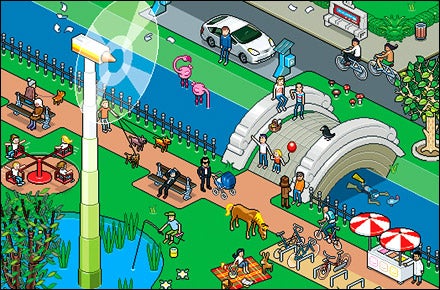“Carbon neutral” was the New Oxford American Dictionary‘s 2006 Word of the Year. But can you define it? The mostly unregulated practice of offsetting can put do-gooders at the mercy oflatter-day Charles Ponzis focusing on another kind of green. So, a quick rundown: Carbon offsets are reductions in one place that cancel out emissions in another. Renewable-energy credits (RECs, or green tags) are tradable certificates representing renewable energy that replaces the dirty power you buy from your utility company. The challenges are twofold: making sure your offset retailer is selling a legitimate product, and resisting the temptation to use offsetting as a license for indulgence. So, how green are your efforts? Take our free self-audit.
1. Before buying offsets, you get a free home energy audit at to determine your home’s carbon footprint. (+3 points)
2. You replace your old fridge (one of the biggest electricity hogs in any house) with GE’s Monogram 360S, which uses 27 percent less energy than federal standards. (+6)
3. You upgrade your old 70-percent-efficiency furnace to a new 95-percent-efficient model. (+8)
4. But then you crank the heat to 80. (7)
5. When it’s 65 outside. (13)
6. You calculate your overall carbon footprint using a reliable calculator, like . (+2)
7. You look for the calculator but get sidetracked on YouTube. (2)
8. You purchase offsets from a retailer endorsed by Clean Air, Cool Planet’s () recent independent audit. (+7)
9. You ask your offset retailer if its portfolio is actually composed of additional offsets, rather than ones already mandated by law. (+1)
10. You find out, as Coldplay did after its 2005 tour, that many of the mango trees planted to offset your emissions died from neglect. (3)
11. Since offsets are a virtual commodity, you ask your provider how they guarantee that the same offset isn’t sold to multiple buyers. (+1)
12. You move to one of the 36 states the EPA lists as having renewable-energy programs. (+4)
13. But then you decide that the extra 2 cents per kilowatt-hour some utilities charge for renewable energy (about $200 per year for an average home) isn’t worth it. (3)
14. Your local utility doesn’t have a renewables program, so you purchase RECs from a reseller recommended by the nonprofit Center for Resource Solutions (). (+2)
15. You start a green team at work to reduce energy use by your employer. (+3)
16. Your car is a hybrid. (+2)
17. Your car is a truck. (1)
18. You don’t own a car. (+10)
19. You budget for all your travel emissions at and offset them at. (+2)
20. You cut up your Visa card and sign up for aBright Card (), set to launch in May, which will give customers offsets instead of flier miles. (+3)
21. Your first purchase onthe card is:
(a) a bicycle, saving 20 pounds of CO2 for every gallon of gas you don’t burn. (+7)
(b) a DVD of An Inconvenient Truth for your friends (+3)
(c) a fill-up for your Prius (0)
(d) 20-inch rims for your Escalade (6)
Your Score
(<010) Thanks for reading, Mr. Cheney.
(11��20) You’ve heard about this global-warming thing?
(21��30) Good work, but someone may be Coldplaying you.
(31��40) A polar bear would still eat you, but he’d feel guilty.
(41+) What footprint?


